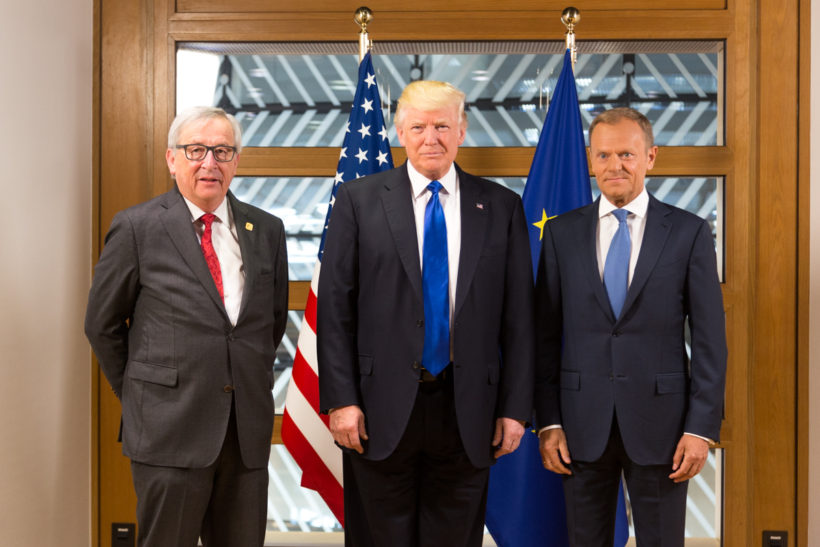


With Donald Trump's return to the White House, the international community is bracing for potential changes in US foreign policy. Trump's personal relationships with leaders like Putin and Xi may have an impact on US-Russian and US-China relations. While Trump has publicly praised these leaders, his actions as President have not always aligned with his words. As the US continues to face challenges on the global stage, the world is watching to see how Trump's second presidency will unfold.
Trump's Return to the White House: Implications for U.S. Foreign Policy
Background
Donald Trump's presidency from 2017 to 2021 was characterized by significant changes in U.S. foreign policy. He withdrew the United States from the Trans-Pacific Partnership, the Iran Nuclear Deal, and the Paris Agreement on climate change. He also imposed tariffs on imports from China, leading to a trade war.
Trump's personal relationships with world leaders were a defining feature of his presidency. He developed close ties with Russian President Vladimir Putin and North Korean leader Kim Jong-un. He was also openly critical of German Chancellor Angela Merkel and Canadian Prime Minister Justin Trudeau.
Potential Changes with Trump's Return
With Trump's potential return to the White House, many observers are speculating about what changes could occur in U.S. foreign policy. One possibility is that Trump will continue to pursue his "America First" agenda, which prioritizes U.S. interests over those of other countries. He may also withdraw from additional international organizations and agreements.
Trump's personal relationships with world leaders could also have an impact on foreign policy. If he maintains close ties with Putin and Xi Jinping, president of China, it is possible that he will be more willing to accommodate their interests.
Top 5 FAQs
Trump has criticized many international organizations and agreements, so it is possible that he will withdraw from more if he returns to office.
Trump's personal relationships with world leaders could have a significant impact on foreign policy. For example, if he continues to have close ties with Putin, it is possible that he will be more willing to accommodate Russian interests.
Trump has taken a tough stance on China, imposing tariffs and criticizing its trade practices. If he returns to office, it is likely that he will continue to be confrontational in his approach to China.
Trump has praised Putin and has been reluctant to criticize Russia's interference in the 2016 U.S. election. If he returns to office, it is possible that he will be more willing to accommodate Russian interests.
Trump's policies have been disruptive to the global order, and his potential return to the White House could further weaken international institutions and cooperation.

The FBI announced the arrest of Cindy Rodriguez Singh, one of its 'top 10 most wanted fugitives', from India in connection with the murder of her six-year-old son. She was charged with Unlawful Flight to Avoid Prosecution and Capital Murder. Patel commended the Indian and US agencies for their coordination in the case and noted that this is the fourth '10 Most Wanted' fugitive arrested in the past seven months. Singh's son had severe health and developmental issues and she allegedly fled to India to avoid prosecution, but justice knows no borders and the FBI never gives up on those who harm the innocent.

In a significant move, the descendants of Netaji Subhas Chandra Bose have urged Prime Minister Narendra Modi to institute a tradition of hoisting the National Flag at the Red Fort every year, to commemorate the establishment of the Azad Hind Government on October 21. The Azad Hind Government, formed under Netaji's leadership, played a key role in the fight for India's independence during World War II. With the 82nd anniversary of its establishment approaching, this request holds even more significance in honoring the sacrifices made by the Azad Hind Fauj.

Prime Minister Narendra Modi spent Diwali in an unconventional manner, celebrating the festival of lights with Indian Navy personnel onboard the aircraft carrier INS Vikrant. During his visit, Modi praised the INS Vikrant as a symbol of Aatmanirbhar Bharat and also witnessed a stunning air power demo by MiG 29K fighter jets taking off and landing on the short runway of the aircraft carrier. Modi was also deeply moved by a special cultural performance by the sailors, dedicated to the success of the Indian Armed Forces. He ended the evening by joining in the tradition of Bara Khana with the naval personnel. On the next day, Modi joined a yoga session on deck and watched a spectacular steampast of warships and flypast by aircraft.

Indian Prime Minister Narendra Modi celebrated Diwali with Navy personnel on the country's new aircraft carrier, INS Vikrant. He extended Diwali greetings to the nation and shared highlights from his visit, including an air power demonstration and cultural program. PM Modi also addressed the significance of Diwali and expressed his best wishes to the families of the Navy personnel.

In a tense meeting at the White House, President Donald Trump urged Ukrainian President Volodymyr Zelensky to accept Russian President Vladimir Putin's terms for ending the two-year war in Ukraine. Despite seeking more military support from the US, Zelensky was met with resistance from Trump, who reportedly engaged in a "screaming match" with the Ukrainian leader. The US leader even claimed that Putin saw the conflict as a "special operation" rather than a full-fledged war, further complicating negotiations between the two nations.

As Liverpool struggled to find their form in a tough game against Manchester United, Dutch midfielder Cody Gakpo stood out with his sharp attack and strong composure. Despite hitting the woodwork three times, Gakpo managed to score a brilliant equalizer for his team, showcasing his potential and talent on the field. While Liverpool may have lost the match, Gakpo's impressive performance provided a glimmer of hope for a struggling team.

Ayodhya's Deepotsav 2025 was a shining example of faith, community, and innovation as the city set two new world records with over 26 lakh diyas and a grand aarti performed by 2,100 priests. The event, witnessed by Chief Minister Yogi Adityanath, also showcased a spectacular 3D projection mapping and drone light show that brought Lord Ram's story to life in the night sky. The event was a testament to the deep connection Ayodhya's youth have with Lord Ram's ideals and was made possible by the hard work of over 40 potter families and thousands of volunteers.

In a brazen and perfectly orchestrated robbery, a group of thieves infiltrated the world-famous Louvre Museum in Paris on Sunday morning and made off with a collection of priceless jewels with an estimated value in the millions. French officials confirmed the robbery and began a detailed investigation to determine how the culprits managed to evade the museum's advanced security systems and execute the crime in under seven minutes. This latest incident has raised serious concerns about the protection of national treasures at one of the world's most popular tourist destinations.

In an audacious heist, a group of armed thieves breached security at the iconic Louvre Museum in Paris and stole nine valuable jewels from the collection of Napoleon Bonaparte and Empress Joséphine. The robbery, which took place in just seven minutes, has prompted a full-scale police investigation and raised concerns about the museum's security. French officials are working to recover the stolen items, but the Louvre remains closed to visitors.

Despite a ceasefire in early October, the conflict between Israel and Palestine shows no signs of abating, with reports of ongoing deadly clashes and Israeli tank fire targeting a car in Gaza City. The closure of the Rafah border crossing to Egypt, citing Hamas's failure to retrieve bodies, has further exacerbated tensions. However, experts warn of the uncertain future for a transitional government in Gaza and the risk of breaching the fragile ceasefire. The violence and closure highlight the ongoing humanitarian crisis and the need for both sides to engage in peaceful negotiations.